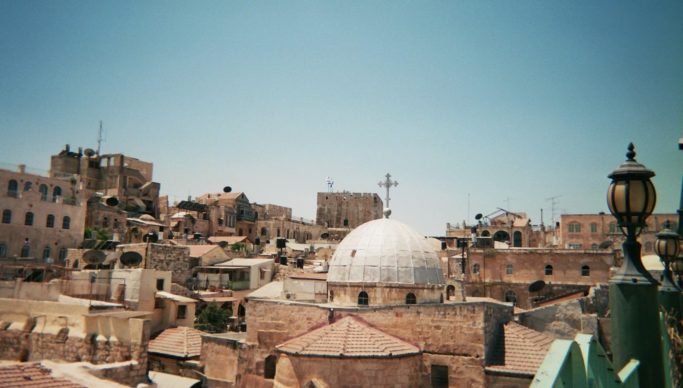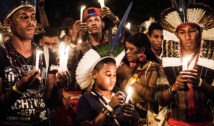
Anti-Christian Incidents Grow in Israel
- By Gladys McBride --
- 23 Aug 2023 --
Church leaders fear an increasing wave of anti-Christian incidents in the Holy Land, largely due to little or no attention given by law enforcement and government officials. Their pleas have, until recently, fallen on deaf ears since the December 2022 Israeli elections which shifted power into the hands of nationalists and ultra-Orthodox Jews.
With just a few arrests made, dozens of religious extremists have been energized, triggering more attacks around the country.
“The number of the incidents, the intensity and brazenness, leads us to believe that these fringe elements in society are becoming emboldened because they believe that certain elements in the government have their backs,” according to David Parsons, vice president of the evangelical International Christian Embassy of Jerusalem (ICEJ).
Parsons hopes that the government will be more proactive going forward, especially since his organization expects over 3,000 evangelical Christians from 90 countries to attend the annual Feast of Tabernacles this fall.
Parson’s hoped-for shift of attention and focus may be happening. Earlier this month {August} Israeli president Isaac Herzog, visited Haifa’s Stella Maris Monastery and Catholic Church following repeated attacks on the Catholic holy site by an ultra-Orthodox Jewish sect.
“I come here on behalf of the entire state and people of Israel to reinforce our commitment to the full protection of freedom of religion and worship in the State of Israel,” the president told local Christians, who account for about 2% of Israel’s population of nearly 10 million.
Herzog pointed out there have been several “very serious incidents” against the various Christian denominations in recent months.
“I view this phenomenon extremely seriously; it is unacceptable in any way. This phenomenon needs to be uprooted, and I am very grateful to the Israel police and the enforcement agencies for taking this issue seriously,” he said.
Earlier in the year following an assault on Christians praying at the Southern Steps in the Old City by dozens of Orthodox Jews who surrounded them, physically attacking some, Israeli lawmakers at the annual Jerusalem Prayer Breakfast apologized for the incident.
“This behavior is completely unacceptable in my eyes. I would like to take this opportunity to apologize for this behavior on behalf of the Knesset,” Israel’s parliament, MK Matan Kahana, a former minister of religious affairs said.
Event attendee, Juergen Buehler, executive director of the ICEJ, commented of the incident, “In the 30 years I have lived in Israel, I have never seen such hatred and anger in someone’s eyes.”
Incidents this year alone include the desecration of graves at the Anglican church on Jerusalem’s Mount of Olives and the destruction of a statue of Jesus by a visiting American Jew who shouted, “No idols in the holy city of Jerusalem!” while bludgeoning the statue’s face with a hammer.
The incidents are organized by extremist groups like Lehava, who consider Christians to be enemies of the Jewish people.
Lehava founder Bentzi Gopstein, who was once indicted for racism, violence and incitement of terrorism, claims that Christians have spent billions of dollars to “disseminate spiritual poison” in Israel. “Missionary work must not be given a foothold. Let’s throw the vampires out of our land before they drink our blood again,” he wrote in a 2015 essay.
Sara Hirschhorn, a historian and political analyst, said Lehava is a “very fringe movement” that believes the land of Israel is for Jews alone. “It is violently anti-Arab and anti-miscegenation, and pro Jewish purity and supremacy. It’s like a gang in the U.S. whose ideology is virulent and violent.” Hirschhorn believes that ever since the religious right formed the current governing coalition, such groups “don’t have fear of negative consequences like being thrown into prison or disbanded. They feel they can carry on what they’re doing fairly unimpeded.”
Although the police have vowed to become more watchful and although additional security measures are evident around Christian sites in the Old City’s Christian Quarter—such as more cameras and a new hotline for reporting anti-Christian incidents—skepticism remains among local Christians.
Wadi Abunassar, a prominent Israeli Christian in Haifa, while pleased with the President’s visit and pledge, predicted that as long as extremist lawmakers are in the government, there will not be accountability. “In every country in the world there are criminals, terrorists, troublemakers,” he said. What is important “is whether state authorities are doing anything to deter the attacks.”
Abunassar recalled a conversation he had with an Israeli rabbi who expressed support for the Christian community.
“The rabbi compared the extremists to aggressive dogs. He said the dogs have always been here, but they were chained. Now, because of the government, there is no chain.”



















